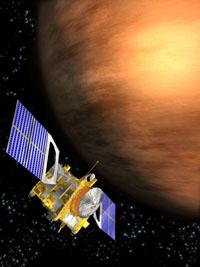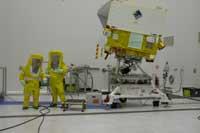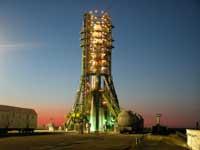Venus Express, destination Venus
2005/12/04 Rementeria Argote, Nagore - Elhuyar Zientziaren Komunikazioa

The Venus Express probe will orbit for spring.
The European Space Agency (ESA) is directed to Mars Express Mars. It is no wonder that in recent years the red planet has been the main protagonist in the observation of space. But the time of Venus has come and, now, ESA has sent Venus Express, her brother, to Mars.
Venus is the brightest planet in the sky, so man has looked from ancient times. And the desire to know Venus better is not recent. Imagine that in the 1960s some thirty probes were sent. But those missions were so successful.
The first probe that crossed the land of Venus was the Soviet Venera 7, which lasted only 20 minutes, destroyed by pressure (the surface pressure of Venus is 90 times higher than that of Earth). In fact, Venus has a very compact atmosphere, mainly composed of carbon dioxide.

Carbon dioxide in the atmosphere contributes to the greenhouse effect on Venus and is also closer to the Sun than Earth. Consequently, the temperature is very high: The average surface of Venus is 465 °C.
The atmosphere of Venus is very special. Not only for its composition but also for its clouds. The clouds are at a height of 50-65 kilometers: clouds formed by drops of sulfuric acid. The wind speed at this height is huge (about 300 kilometers per hour), so the clouds move very fast. Thus, the phenomenon called superrotation occurs: the clouds only need four days to turn the planet.
Looking into the atmosphere
The main objective of Venus Express is to study this atmosphere. It is a question of studying the atmospheric structure, meteorology and structure and dynamics of clouds, among others.
The probe reaches the orbit of Venus in April, where they expect to spend 486 days collecting data. For this work it carries the latest technology, among others, a camera called Virtis, which will collect data of wide spectrum, from the ultraviolet to the infrared.

Precisely, the Virtis camera is the most important tool carried by the Venus Express probe, as it will contribute to the main objective of the mission, the study of the atmosphere. The data collected by this camera will be analyzed by experts from the University of the Basque Country, headed by physicist and astronomer Agustín Sánchez Lavega. Therefore, they will have privileged data between the hands.
If all goes well, next year, the Venus Express mission will provide data to better know Venus and, in addition to Venus, will give more clues about the Earth and the origin of the rest of the planets surrounding it. In fact, it is believed that Venus and Earth were very similar in origin, in the formation of our solar system. And experts try to figure out why they are so different today, that is, what phenomena caused the two planets to follow so different trajectories.
Published in 7K.




